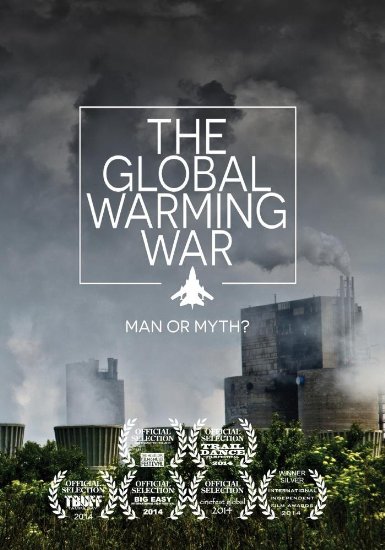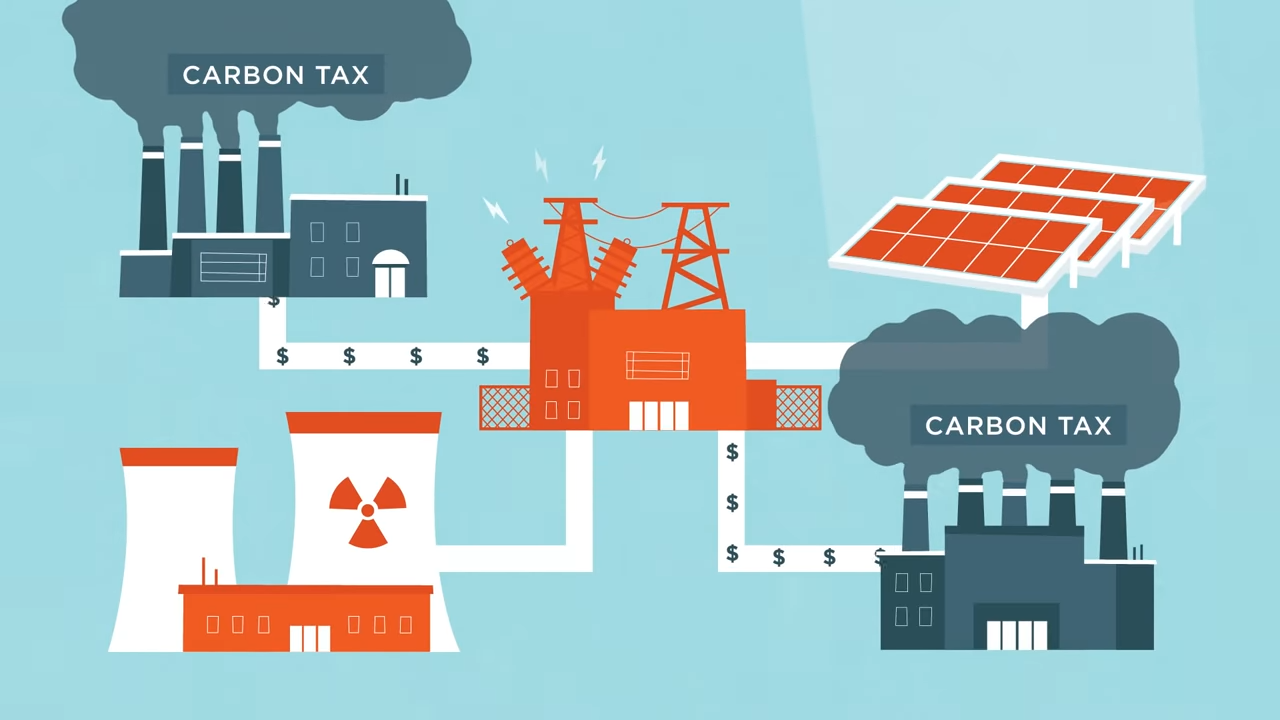The Global Warming War
South House Entertainment
January 8, 2015
78 minutes
“Everything Goes” in the World of Climate Denial
By Nick Brana, SocioEvolved.com
Man-made climate change is real and it threatens our way of life, right?
“Wrong,” says The Global Warming War, which disputes the theory that anthropocentric carbon emissions are producing climate change. The documentary opens by claiming to want an honest debate. Yet constructive deliberation requires an accurate representation of the basic science and the level of agreement among climatologists. This is where the film veers into climate denial, never to return.
The Global Warming War consistently misrepresents climate science and its own impartiality. The film claims that it is “not motivated by political bias, money, or emotionalism” but features commentators from conservative think tanks funded by the fossil fuel industry. It claims to seek “facts from the experts who spend their lives studying Earth’s climate,” but ignores the overwhelming body of peer-reviewed research confirming anthropocentric warming, choosing instead to magnify a small fringe of cherry-picked dissenters, the vast majority of whom are not climatologists and are not publishing peer-reviewed science in the field.
Often the film doesn’t even agree with itself. One minute it asserts that the earth isn’t warming, and the next minute it decides that solar fluctuations are responsible for the warming. One minute it asserts that there is no scientific consensus, and the next it decides that the consensus is orchestrated by the corrupt climatologists of the United Nations Intergovernmental Panel on Climate Change.
The documentary’s approach reflects the highly successful climate denial strategy of inundating the public with a chaotic array of opinions, from non-climatologists, and then heralding them as equivalent in merit to the peer-reviewed science—as Isaac Asimov sardonically put it, “My ignorance is just as good as your knowledge.”
According to the film, “As of summer 2014: global temperatures have not risen for 18 years.” Skeptics arrive at this deceptive statement by using the abnormally hot El Niño year of 1998 as reference and by overlooking the oceans as a component of the earth’s climate system. The oceans have an enormous absorptive capacity for heat and carbon dioxide. Land and ice also absorb atmospheric heat. In order to accurately evaluate the pace of global warming, we mustn’t track surface temperatures alone but the total heat content of the earth.
Studies tracking the heat content of the world’s oceans, atmosphere, and land over the past half century find that each continues to warm, with the oceans absorbing the most heat. As NASA points out, “With the exception of 1998, the 10 warmest years in the 134-year record all have occurred since 2000, with 2010 and 2005 ranking as the warmest years on record.” Estimates from the National Oceanic and Atmospheric Administration (NOAA) and the World Meteorological Organization show that 2014 is on track to set a new record as the hottest year in recorded history.
In depicting climate change as disputed science, the documentary touts the infamous Oregon Petition of “31,000 American scientists” who reject the anthropocentric warming theory. In truth, the validity of this petition has been repeatedly debunked. Fewer than 1 percent of the signatories had a background in climatology. Furthermore, anyone could add their name, leaving the petition rife with fraudulent signatories such as “Michael J. Fox” and “John C. Grisham.” Of course, these are minor discrepancies in the eyes of the skeptics in the film, who continue to parade the petition as evidence of widespread scientific dissent.
Among its non-climatologist guests, The Global Warming War prominently features skeptic Marc Morano, whose former employment includes the vociferous climate deniers Rush Limbaugh and Senator James Inhofe. Morano flatly tells us that the scientific literature doesn’t support anthropocentric climate change. Yet a review of the literature shows that for two decades now there has been an overwhelming consensus among climatologists in support of the anthropocentric warming theory.
In the past five years, three studies using different methodologies have confirmed that 97 percent of climate scientists publishing peer-reviewed research agree that human activity is causing climate change. The 97 percent figure is sustained by independent assessments of peer-reviewed papers and by the self-assessments of publishing climatologists. The consensus is equally apparent when quantifying the literature, where out of 13,950 peer-reviewed climate articles published between 1991 and 2012, only 24 articles explicitly rejected “human-caused global warming,” a result consistent with other examinations.
The weight of the evidence has prompted the National Academy of Science, the American Meteorological Society, the American Geophysical Union, the American Association for the Advancement of Science, the Pentagon, NASA, NOAA, and nearly 200 academies of science and scientific organizations from around the world to accept that “climate change has been caused by human action.”
With a 97 percent consensus, the debate among climate scientists is over. So where is all the public noise and confusion coming from? In an unintentionally comic moment, the film features John Coleman, co-founder of the Weather Channel, discussing the climate denial movement and boldly declaring: “There isn’t any funding by big oil. There isn’t any money coming in. This isn’t happening.” But, alas, it turns out that the money is coming from those who have the most to lose by recognizing carbon as a major greenhouse gas pollutant: the fossil fuel industry and controlling billionaires.
In 2013, a landmark Drexel University study examined contributions to skeptical NGOs and found that “140 foundations funneled $558 million to almost 100 climate denial organizations from 2003 to 2010”—an amount author Robert Brulle says represents just the tip of the climate denial iceberg. The NGOs have a combined annual income of $900 million. The study also detailed how Exxon Mobil and the oil-rich Koch brothers were “heavily involved” in funding climate denial from 2003 to 2007, at which point traceable contributions plummeted and the money began shifting to untraceable contributions. The study reports that about 75 percent of the money going to climate denial organizations now comes from untraceable sources.
A separate investigation by the Guardian revealed that from 2002 to 2010, conservative billionaires, such as the Koch brothers, routed $118 million in “dark money” via two trusts to 102 skeptical think tanks and NGOs. The film hosts Marlo Lewis from one such think tank, the Competitive Enterprise Institute.
While the big four oil companies have rhetorically softened their position on climate change in the past few years, their outlays tell a different story. Data from the Senate Office of Public Records shows that the oil and gas industry spends more than $100 million lobbying elected officials in Washington, about 90 percent of which goes to climate-denying Republicans. Since 1998, the oil and gas lobby has spent a total of $1.6 billion “educating” politicians about climate change, among other issues. A glimpse of the American political landscape reveals significant returns on investment, with one of two major political parties integrating climate denial into its platform.
The Global Warming War is brimming with further misrepresentations, including the validity of the cosmic ray theory, the evidence behind the hockey stick climate graph, the global generalizability of the Medieval Warm Period, and whether global warming preceded increases in atmospheric carbon concentrations in the past. “Everything goes” in the world of climate denial.
When medical research proved that smoking causes cancer, the tobacco industry waged a decades-long propaganda campaign against the scientific consensus. The goal was not to exonerate cigarettes, but to cast doubt on the science. The longer the industry could sow confusion, the longer it could bolster sales and avoid health regulations—at a devastating cost to the public. With some help from the political class and the corporate media, the fossil fuel industry has similarly manufactured a false controversy around the science of man-made climate change.
Humanity’s anthropocentric notion of dominion over the earth dates back millennia. But for all our vain efforts to separate ourselves from nature, we are but one species in an intricate web of life, adrift together on a pale blue dot. An assault on the environment is an assault on humanity, particularly the poorest among us. We shall suffer the same fate that we inflict upon the biosphere.
Note: The filmmakers have been invited to respond to this review.



